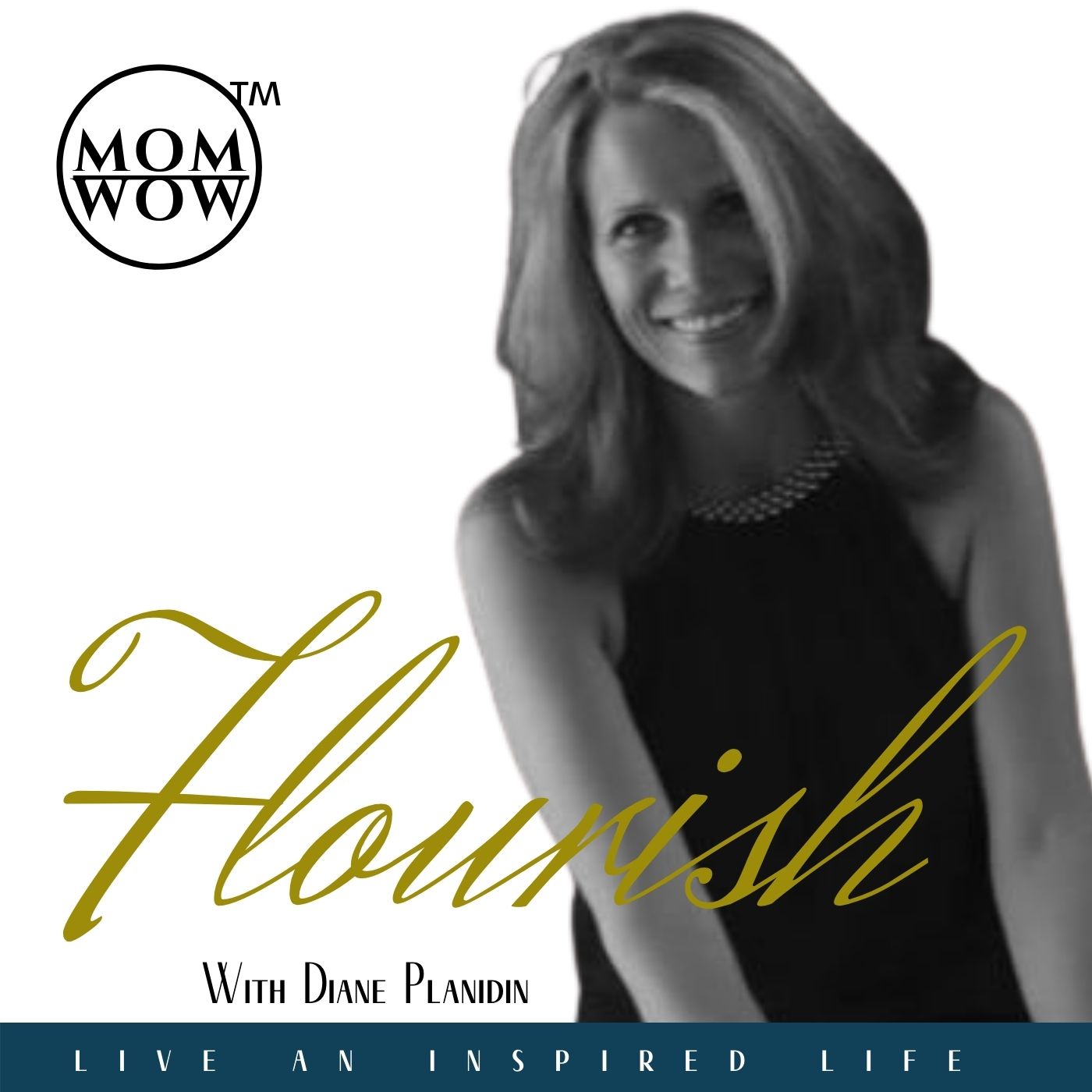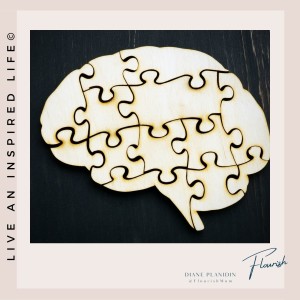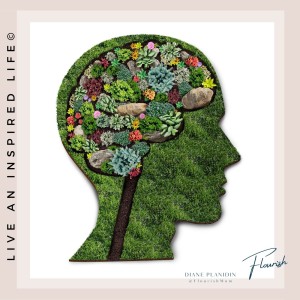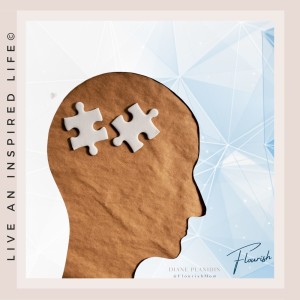
11.3K
Downloads
337
Episodes
I know that you believe in yourself, you believe in self-development and helping your children or those you influence live with a healthy mind, body and heart. For that, I applaud you. Live an Inspired Life and Flourish! The goal of this show is to help you not only raise healthy & happy children, but to also work on your own personal development. We are all born with a Gift. We are all born with Purpose. Life‘s journey is to hone and develop that Gift, as purpose changes within. Share your knowledge of self-empowerment with those you influence, after all it‘s easier to raise a child with a positive mindset than it is to fix a broken one. How you speak and how you act around your children becomes their inner voice. Once you have self-awareness it‘s easier to thrive and grow, be your child‘s inspiration and advocate for their well being. https://www.Flourish.Mom. #personaldevelopment #mindset #motivation #inspiration #successtips #selfesteem #parenting #Believe #selfhelp #goals #habits #timemanagement #success #selfcare #selflove #bestseller #inspired #FlourishMom #time #howto #coach #personalgrowth #mentalhealth #health #fitness #wellness #meditation #spirituality #loa #thesecret #womenempowerment #parentingtips #highperformance #inspiredlife #inspireddiane #greatness #growth
Episodes

Sunday Aug 28, 2022
Sunday Aug 28, 2022
“How have I become the kind of person I am today?” Every adult ponders this question from time to time. The answers that readily come to mind include the influences of parents, peers, temperament, a moral compass, a strong sense of self, and sometimes critical life experiences such as parental divorce. Social and personality development encompasses these and many other influences on the growth of the person. In addition, it addresses questions that are at the heart of understanding how we develop as unique people. How much are we products of nature or nurture? How enduring are the influences of early experiences? The study of social and personality development offers perspective on these and other issues, often by showing how complex and multifaceted are the influences on developing children, and thus the intricate processes that have made you the person you are today.
Childhood social and personality development emerges through the interaction of social influences, biological maturation, and the child’s representations of the social world and the self. This interaction is illustrated in a discussion of the influence of significant relationships, the development of social understanding, the growth of personality, and the development of social and emotional competence in childhood.
This Episode has the following objectives:
-Provide specific examples of how the interaction of social experience, biological maturation, and the child’s representations of experience and the self provide the basis for growth in social and personality development.
-Describe the significant contributions of parent–child and peer relationships to the development of social skills and personality in childhood. -Explain how achievements in social understanding occur in childhood. Moreover, do scientists believe that infants and young children are egocentric?
-Describe the association of temperament with personality development.
-Explain what is “social and emotional competence“ and provide some examples of how it develops in childhood.
Live an Inspired Life!
#Mindset #QueensU #Becoming
Find out more about Flourish at the links below:
➡️ Facebook https://www.Facebook.Com/Flourish.Mom
➡️ Twitter: https://www.Twitter.Com/FlourishMom
➡️ Instagram: https://www.Instagram.com/FlourishMom
➡️ Pinterest: https://www.Pinterest.ca/WowFlourishMom
➡️ Watch on YouTube: https://youtu.be/thkpuNInzPU
PSYC 100: Principles of Psychology F21 by PSYC100 is licensed under a Creative Commons Attribution-NonCommercial-ShareAlike 4.0 International License, except where otherwise noted.
Open Courseware Link: Retrieved from: This material is attributed to the Diener Education Fund (copyright © 2018) and can be accessed via this link: http://noba.to/gdqm6zvc.
Note: I am a student and not a teacher - I am sharing my learning journey with you!

Sunday Aug 28, 2022
Sunday Aug 28, 2022
Autistic people often struggle with initiating, maintaining, and understanding social interactions. Social neuroscience is the study of the parts of the brain that support social interactions or the “social brain.” This module provides an overview of ASD and focuses on understanding how social brain dysfunction leads to ASD. Our increasing understanding of the social brain and its differences in ASD will allow us to better identify the genes that cause ASD and will help us to create and pick out treatments to better match individuals.
Because social brain systems emerge in infancy, social neuroscience can help us to figure out how to diagnose ASD even before the symptoms of ASD are clearly present. This is a hopeful time because social brain systems remain malleable well into adulthood and thus open to creative new interventions that are informed by state-of-the-art science.
This episode will help you:
- Know the basic symptoms of ASD.
- Distinguish components of the social brain and understand their differences in ASD.
- Appreciate how social neuroscience may facilitate the diagnosis and treatment of ASD.
Live an Inspired Life!
#Autism #QueensU #Education
Find out more about Flourish at the links below:
➡️ https://www.Flourish.Mom
➡️ Facebook https://www.Facebook.Com/Flourish.Mom
➡️ Twitter: https://www.Twitter.Com/FlourishMom
➡️ Instagram: https://www.Instagram.com/FlourishMom
➡️ Pinterest: https://www.Pinterest.ca/WowFlourishMom
➡️ Watch on YouTube: https://youtu.be/cyT_U9YD338
PSYC 100: Principles of Psychology F21 by PSYC100 is licensed under a Creative Commons Attribution-NonCommercial-ShareAlike 4.0 International License, except where otherwise noted.
Open Courseware Link: This material is attributed to the Diener Education Fund (copyright © 2018) and can be accessed via this link: http://noba.to/yqdepwgt
Note: I am a student and not a teacher - I am sharing my learning journey with you!

Sunday Aug 28, 2022
Sunday Aug 28, 2022
What is cognitive development? Explore major theories about how it occurs, the roles of nature and nurture, whether it is continuous or discontinuous, and how research in the area is being used to improve education.
This episode will help you -
- Be able to identify and describe the main areas of cognitive development.
- Be able to describe major theories of cognitive development and what distinguishes them.
- Understand how nature and nurture work together to produce cognitive development.
- Understand why cognitive development is sometimes viewed as discontinuous and sometimes as continuous.
- Know some ways in which research on cognitive development is being used to improve education.
Live an Inspired Life!
#Mind #QueensU #Education
Find out more about Flourish at the links below:
➡️ https://www.Flourish.Mom
➡️ Facebook https://www.Facebook.Com/Flourish.Mom
➡️ Twitter: https://www.Twitter.Com/FlourishMom
➡️ Instagram: https://www.Instagram.com/FlourishMom
➡️ Pinterest: https://www.Pinterest.ca/WowFlourishMom
➡️ Watch on YouTube: https://youtu.be/V-8JGiwbNLA
PSYC 100: Principles of Psychology F21 by PSYC100 is licensed under a Creative Commons Attribution-NonCommercial-ShareAlike 4.0 International License, except where otherwise noted.
Open Courseware Link: This material is attributed to the Diener Education Fund (copyright © 2018) and can be accessed via this link: http://noba.to/8uv4fn9h.
Note: I am a student and not a teacher - I am sharing my learning journey with you!

Sunday Aug 28, 2022
Sunday Aug 28, 2022
People form mental concepts of categories of objects, which permit them to respond appropriately to new objects they encounter. Most concepts cannot be strictly defined but are organized around the “best” examples or prototypes, which have the properties most common in the category. Objects fall into many different categories, but there is usually a most salient one, called the basic-level category, which is at an intermediate level of specificity (e.g., chairs, rather than furniture or desk chairs).
Concepts are closely related to our knowledge of the world, and people can more easily learn concepts that are consistent with their knowledge. Theories of concepts argue either that people learn a summary description of a whole category or else that they learn exemplars of the category. Recent research suggests that there are different ways to learn and represent concepts and that they are accomplished by different neural systems.
This episode will help you:
- Understand the problems with attempting to define categories.
- Understand typicality and fuzzy category boundaries.
- Learn about theories of the mental representation of concepts.
- Learn how knowledge may influence concept learning.
Live an Inspired Life!
#Mind #QueensU #Learning
Find out more about Flourish at the links below:
➡️ https://www.Flourish.Mom
➡️ Facebook https://www.Facebook.Com/Flourish.Mom
➡️ Twitter: https://www.Twitter.Com/FlourishMom
➡️ Instagram: https://www.Instagram.com/FlourishMom
➡️ Pinterest: https://www.Pinterest.ca/WowFlourishMom
➡️ Watch on YouTube: https://youtu.be/_kDrfk3KkwQ
PSYC 100: Principles of Psychology F21 by PSYC100 is licensed under a Creative Commons Attribution-NonCommercial-ShareAlike 4.0 International License, except where otherwise noted.
Open Courseware Link: Retrieved from: http://noba.to/6vu4cpkt
Note: I am a student and not a teacher - I am sharing my learning journey with you!

Sunday Aug 28, 2022
Sunday Aug 28, 2022
One of the most remarkable human capacities is to perceive and understand mental states. This capacity, often labeled “theory of mind,” consists of an array of psychological processes that play essential roles in human social life. We review some of these roles, examine what happens when the capacity is deficient, and explore the many processes that make up the capacity to understand minds.
This capacity develops from early beginnings in the first year of life to the adult’s fast and often effortless understanding of others’ thoughts, feelings, and intentions. And though we must speculate about its evolutionary origin, we do have indications that the capacity evolved sometime in the last few million years.
Live an Inspired Life!
#Psychology #QueensU #Mind
Find out more about Flourish at the links below:
➡️ https://www.Flourish.Mom
➡️ Facebook https://www.Facebook.Com/Flourish.Mom
➡️ Twitter: https://www.Twitter.Com/FlourishMom
➡️ Instagram: https://www.Instagram.com/FlourishMom
➡️ Pinterest: https://www.Pinterest.ca/WowFlourishMom
➡️ Watch on YouTube: https://youtu.be/oecm7QnpPhw
PSYC 100: Principles of Psychology F21 by PSYC100 is licensed under a Creative Commons Attribution-NonCommercial-ShareAlike 4.0 International License, except where otherwise noted.
Open Courseware Link: This material is attributed to the Diener Education Fund (copyright © 2018) and can be accessed via this link: http://noba.to/a8wpytg3.
Note: I am a student and not a teacher - I am sharing my learning journey with you!

Sunday Aug 28, 2022
Sunday Aug 28, 2022
Language and language use constitute a central ingredient of human psychology. Language is an essential tool that enables us to live the kind of life we do. Can you imagine a world in which machines are built, farms are cultivated, and goods and services are transported to our household without language? Is it possible for us to make laws and regulations, negotiate contracts, and enforce agreements and settle disputes without talking?
Much of contemporary human civilization wouldn’t have been possible without the human ability to develop and use language. Like the Tower of Babel, language can divide humanity, and yet, the core of humanity includes the innate ability for language use. Whether we can use it wisely is a task before us in this globalized world.
Live an Inspired Life!
#Psychology #QueensU #Language
Find out more about Flourish at the links below:
➡️ https://www.Flourish.Mom
➡️ Facebook https://www.Facebook.Com/Flourish.Mom
➡️ Twitter: https://www.Twitter.Com/FlourishMom
➡️ Instagram: https://www.Instagram.com/FlourishMom
➡️ Pinterest: https://www.Pinterest.ca/WowFlourishMom
➡️ Watch on YouTube: https://youtu.be/UMftw4bt4cE
PSYC 100: Principles of Psychology F21 by PSYC100 is licensed under a Creative Commons Attribution-NonCommercial-ShareAlike 4.0 International License, except where otherwise noted.
Open Courseware Link: This material is attributed to the Diener Education Fund (copyright © 2018) and can be accessed via this link: http://noba.to/gq62cpam.
Note: I am a student and not a teacher - I am sharing my learning journey with you!

Sunday Aug 28, 2022
Mistaken Identity | Psych-100 | Chapter 33 | Flourish with Diane Planidin
Sunday Aug 28, 2022
Sunday Aug 28, 2022
When an eyewitness stands up in front of the court and describes what happened from her own perspective, this testimony can be extremely compelling—it is hard for those hearing this testimony to take it “with a grain of salt,” or otherwise adjust its power. But to what extent is this necessary?
There is now a wealth of evidence, from research conducted over several decades, suggesting that eyewitness testimony is probably the most persuasive form of evidence presented in court, but in many cases, its accuracy is dubious. There is also evidence that mistaken eyewitness evidence can lead to wrongful conviction—sending people to prison for years or decades, even to death row, for crimes they did not commit. Faulty eyewitness testimony has been implicated in at least 75% of DNA exoneration cases—more than any other cause (Garrett, 2011).
There is also hope, though, that many of the errors may be avoidable if proper precautions are taken during the investigative and judicial processes. Psychological science has taught us what some of those precautions might involve, and we discuss some of that science now
Live an Inspired Life!
#Psychology #QueensU #Eyewitness
Find out more about Flourish at the links below:
➡️ https://www.Flourish.Mom
➡️ Facebook https://www.Facebook.Com/Flourish.Mom
➡️ Twitter: https://www.Twitter.Com/FlourishMom
➡️ Instagram: https://www.Instagram.com/FlourishMom
➡️ Pinterest: https://www.Pinterest.ca/WowFlourishMom
➡️ Watch on YouTube: https://youtu.be/XHztuqQ_cRE
PSYC 100: Principles of Psychology F21 by PSYC100 is licensed under a Creative Commons Attribution-NonCommercial-ShareAlike 4.0 International License, except where otherwise noted.
Open Courseware Link: This material is attributed to the Diener Education Fund (copyright © 2018) and can be accessed via this link: http://noba.to/uy49tm37.
Note: I am a student and not a teacher - I am sharing my learning journey with you!

Sunday Aug 28, 2022
Sunday Aug 28, 2022
Chances are that you have experienced memory lapses and been frustrated by them. You may have had trouble remembering the definition of a key term on an exam or found yourself unable to recall the name of an actor from one of your favorite TV shows. Maybe you forgot to call your aunt on her birthday or you routinely forget where you put your cell phone. Oftentimes, the bit of information we are searching for comes back to us, but sometimes it does not. Clearly, forgetting seems to be a natural part of life. Why do we forget? And is forgetting always a bad thing?
Five Impediments to Remembering
1. Encoding failures - we don't learn the information in the first place
2. Decay - memories fade over time
3. Inadequate retrieval cues - we lack sufficient reminders
4. Interference - other memories get in the way
5. Trying not to remember - we deliberately attempt to keep things out of mind
Live an Inspired Life!
#Psychology #QueensU #Mindset
Find out more about Flourish at the links below:
➡️ https://www.Flourish.Mom
➡️ Facebook https://www.Facebook.Com/Flourish.Mom
➡️ Twitter: https://www.Twitter.Com/FlourishMom
➡️ Instagram: https://www.Instagram.com/FlourishMom
➡️ Pinterest: https://www.Pinterest.ca/WowFlourishMom
➡️ Watch on YouTube: https://youtu.be/5Qoeky-5A7g
PSYC 100: Principles of Psychology F21 by PSYC100 is licensed under a Creative Commons Attribution-NonCommercial-ShareAlike 4.0 International License, except where otherwise noted.
Open Courseware Link: This material is attributed to the Diener Education Fund (copyright © 2018) and can be accessed via this link: http://noba.to/m38qbftg.
Note: I am a student and not a teacher - I am sharing my learning journey with you!

Sunday Aug 28, 2022
Sunday Aug 28, 2022
Three Stages of the Learning/Memory Process
Psychologists distinguish between three necessary stages in the learning and memory process: encoding, storage, and retrieval (Melton, 1963). Encoding is defined as the initial learning of information; storage refers to maintaining information over time; retrieval is the ability to access information when you need it. If you meet someone for the first time at a party, you need to encode her name (Lyn Goff) while you associate her name with her face. Then you need to maintain the information over time. If you see her a week later, you need to recognize her face and have it serve as a cue to retrieve her name. Any successful act of remembering requires that all three stages be intact. However, two types of errors can also occur. Forgetting is one type: you see the person you met at the party and you cannot recall her name. The other error is misremembering (false recall or false recognition): you see someone who looks like Lyn Goff and call the person by that name (false recognition of the face). Or, you might see the real Lyn Goff, recognize her face, but then call her by the name of another woman you met at the party (misrecall of her name).
Whenever forgetting or misremembering occurs, we can ask, at which stage in the learning/memory process was there a failure?—though it is often difficult to answer this question with precision. One reason for this inaccuracy is that the three stages are not as discrete as our description implies. Rather, all three stages depend on one another. How we encode information determines how it will be stored and what cues will be effective when we try to retrieve it. And too, the act of retrieval itself also changes the way information is subsequently remembered, usually aiding later recall of the retrieved information. The central point for now is that the three stages—encoding, storage, and retrieval—affect one another, and are inextricably bound together.
“Memory” is a single term that reflects a number of different abilities: holding information briefly while working with it (working memory), remembering episodes of one’s life (episodic memory), and our general knowledge of facts of the world (semantic memory), among other types. Remembering episodes involves three processes: encoding information (learning it, by perceiving it and relating it to past knowledge), storing it (maintaining it over time), and then retrieving it (accessing the information when needed). Failures can occur at any stage, leading to forgetting or to having false memories.
The key to improving one’s memory is to improve processes of encoding and to use techniques that guarantee effective retrieval. Good encoding techniques include relating new information to what one already knows, forming mental images, and creating associations among information that needs to be remembered. The key to good retrieval is developing effective cues that will lead the rememberer back to the encoded information. Classic mnemonic systems, known since the time of the ancient Greeks and still used by some today, can greatly improve one’s memory abilities.
Live an Inspired Life!
#Psychology #QueensU #Memory
Find out more about Flourish at the links below:
➡️ https://www.Flourish.Mom
➡️ Facebook https://www.Facebook.Com/Flourish.Mom
➡️ Twitter: https://www.Twitter.Com/FlourishMom
➡️ Instagram: https://www.Instagram.com/FlourishMom
➡️ Pinterest: https://www.Pinterest.ca/WowFlourishMom
➡️ Watch on YouTube: https://youtu.be/FFtJjzqv0lg
PSYC 100: Principles of Psychology F21 by PSYC100 is licensed under a Creative Commons Attribution-NonCommercial-ShareAlike 4.0 International License, except where otherwise noted.
Open Courseware Link: This material is attributed to the Diener Education Fund (copyright © 2018) and can be accessed via this link: http://noba.to/bdc4uger.
Note: I am a student and not a teacher - I am sharing my learning journey with you!

Tuesday Aug 23, 2022
Tuesday Aug 23, 2022
"Self-actualizing people are, without one single exception, involved in a cause outside their own skin, in something outside of themselves. They are devoted, working at something, something which is very precious to them - some calling or vocation in the old sense. They are working at something which fate has called them to somehow and which they work at and which they love, so that they work-joy dichotomy in them disappears...
Being values are the meaning of life for most people, but many people don't even recognize that they have these meta-needs." A.H. Maslow
Join us as we explore human nature and the behaviours that lead to self-actualization. The following 8 episodes are devoted to those behaviours will make a difference in the person you are becoming.
Live an Inspired Life!
Episode Mentioned: Knowledge & Emotions: https://youtu.be/qVDA5BrFVto
Find out more about Flourish at the links below:
➡️ Facebook https://www.Facebook.Com/Flourish.Mom
➡️ Twitter: https://www.Twitter.Com/FlourishMom
➡️ Instagram: https://www.Instagram.com/FlourishMom
➡️ Pinterest: https://www.Pinterest.ca/WowFlourishMom
➡️ Watch on YouTube: https://youtu.be/9ng-6aKph94
